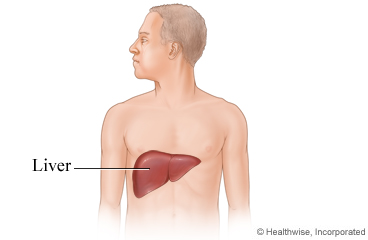
Overview
Hepatitis B is a disease caused by a virus that infects the liver. It spreads through infected blood, semen, and other body fluids during sexual contact. It can be passed from mother to baby during childbirth. It also can spread when people share needles to inject drugs or share things that may have blood on them. These include razors and toothbrushes. Needles used for tattoos, body piercing, or acupuncture can spread the disease if they are not cleaned the right way.
After you get the virus, it may be months before you see symptoms. You may never notice them. You can give the disease to other people before and after you have symptoms.
Hepatitis B can make you tired. It can cause a fever, nausea, vomiting, light-colored stools, and dark urine. Your skin or eyes may look yellow. This is called jaundice.
Most people get better in several weeks, but it can take several months. For some people the virus stays in their bodies. If the virus stays in your body for a long time, it can cause serious liver disease. After you have had the virus and feel better, you will not get it again.
Follow-up care is a key part of your treatment and safety. Be sure to make and go to all appointments, and call your doctor if you are having problems. It's also a good idea to know your test results and keep a list of the medicines you take.
How can you care for yourself at home?
- Reduce your activity to match your energy level.
- Avoid alcohol for as long as your doctor tells you to. This may be months. Alcohol can make liver problems worse.
- Make sure your doctor knows all the medicines you take. Some medicines, such as acetaminophen (Tylenol), can make liver problems worse. Do not take any new medicines unless your doctor says it is okay.
- Be safe with medicines. If your doctor prescribes antiviral medicine, take it exactly as prescribed. Call your doctor if you think you are having a problem with your medicine.
- If you have nausea or vomiting, try to eat smaller meals and eat more often.
- Drink plenty of fluids. If you have kidney, heart, or liver disease and have to limit fluids, talk with your doctor before you increase the amount of fluids you drink.
- If you have itchy skin, keep cool, stay out of the sun, and wear cotton clothing. Talk to your doctor about medicines that can be used for itching. Read and follow the instructions on the label.
How can you avoid spreading hepatitis B?
- Tell the people you live with or have sex with about your illness as soon as possible. The CDC recommends that people in close contact with an infected person get the hepatitis B vaccine.
- Do not donate blood or blood products, organs, sperm, or eggs (ova).
- Stop all sexual activity or use latex condoms. Do this until your doctor tells you that you can no longer give hepatitis B to others. Avoid anal contact with a sex partner while you are infected.
- Do not share personal items that may have your blood on them. These include razors, toothbrushes, towels, and nail files.
- Use lotions or ointments to prevent chapped or broken skin. These skin problems can expose others to your blood.
- Tell your doctor, dentist, and anyone else who may come in contact with your blood about your illness.
- If you are pregnant, tell the doctor who will deliver your baby about your illness. Be sure your baby gets medicine to prevent infection. This should start right after birth.
- If you get blood on your clothing or other fabrics, clean them well.
- Be sure to carefully get rid of sanitary napkins and tampons or other disposable items that have your blood on them. Place them in sealed plastic bags before you throw them away.
- Use a solution of 1 part bleach to 10 parts water to clean surfaces that have your blood or any other body fluid (such as semen or menstrual blood) on them. These surfaces include toilet seats, countertops, and floors.
- If you have long-term hepatitis B, always use latex condoms during any sexual activity. You can infect others with the virus even if you do not have symptoms.
When should you call for help?
Call 911 anytime you think you may need emergency care. For example, call if:
- You passed out (lost consciousness).
- You vomited blood.
Call your doctor now or seek immediate medical care if:
- You have new or worse belly pain.
- You have a new or higher fever.
- You are dizzy or lightheaded, or you feel like you may faint.
- You have symptoms of dehydration, such as:
- Dry eyes and a dry mouth.
- Passing only a little urine.
- Feeling thirstier than normal.
- You cannot keep down medicine or fluids.
- You have new or more blood in stools.
- You have new or worse vomiting or diarrhea.
Watch closely for changes in your health, and be sure to contact your doctor if:
- You do not get better as expected.
Where can you learn more?
Go to http://www.healthwise.net/patientEd
Enter I471 in the search box to learn more about "Hepatitis B: Care Instructions".
Current as of: April 30, 2024
Author: Ignite Healthwise, LLC Staff
Clinical Review Board
All Healthwise education is reviewed by a team that includes physicians, nurses, advanced practitioners, registered dieticians, and other healthcare professionals.

